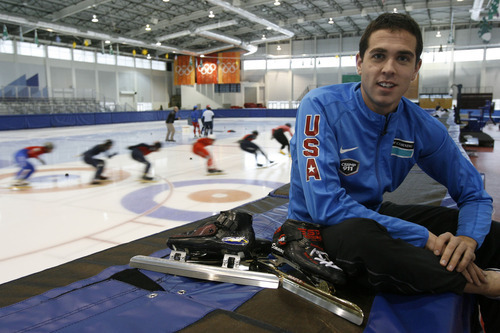This is an archived article that was published on sltrib.com in 2010, and information in the article may be outdated. It is provided only for personal research purposes and may not be reprinted.
Kearns • Speedskater Ryan Bedford used to think that to excel in the short-track discipline of his sport, he needed to spend hours and hours training specifically for that wild and treacherous event.
Not anymore.
The 24-year-old former Salt Lake City resident has discovered he fares best in short-track when he practically doesn't train for it at all — which is how he will approach the U.S. Short-Track Championships at the Utah Olympic Oval this weekend. It wasn't until only three days before his first race that Bedford so much as tried on his short-track skates for the first time in nearly two weeks.
"It's such a weird situation," he said.
While it's not unusual for top speedskaters to occasionally train for short-track — world-record holder Shani Davis is probably the sport's most famous example, having honed his spectacular ability to skate the turn in part through his training on the tight corners of the short-track rink — it's rare for them to compete at an elite level in both disciplines.
Yet Bedford finished 12th in the long-track 10,000 meters at the 2010 Vancouver Olympics, then qualified to compete on the World Cup circuit in short-track for the third straight season.
In his first World Cup competition earlier this month in China, he won a bronze medal in the 500 and a silver in the team relay … all off just three short-track practices in the days leading up to the races. Bedford also is the reigning national champion at 10,000 meters, and will be back for the U.S. Speedskating Championships at the end of the month.
"He really shouldn't be doing what he's doing," his coach, former Olympic bronze medalist Kip Carpenter, marveled.
Part of the reason he can is that Bedford spent his early years in the sport dedicated exclusively to short-track, helping him build a mountain of expertise after hours and hours on the ice.
Now, even though he moved to long-track three years ago in the wake of some disappointing results at the short-track national championships, Bedford can switch back easily.
When he does, he just feels fresher, stronger and more confident.
"It's like riding a bicycle," he said. "When I get back out on the ice, I have trust in myself that I'll remember how to do things the right way and race. That mentality never leaves you."
It doesn't hurt that Bedford maintains his strength and fitness with the grueling workouts required for his long-track specialities — the 5,000 and 10,000 distance races. Or that his lack of short-track training keeps him from worrying much about his results in a sport where the slightest mistake can ruin everything.
In fact, it was training for short-track too much last year that he believes kept him from making the Olympic team in both disciplines.
"I was tired, I was a little weak" at the trials races, he recalled. "Instead, if I would have skated long-track more, trained more towards that, I would have had a little more in my legs, I think."
Bedford won't make that mistake next time.
He said he plans to stick with his current training plan until the 2014 Sochi Olympics in Russia, where he hopes to compete in both disciplines and perhaps win the medal that eluded him in Vancouver. Bedford said he loved his first Olympics, but acknowledged he allowed himself to get carried away with the experience at the expense of his competition.
The Michigan native is working now with Carpenter in Milwaukee, where Bedford moved from Utah last summer after U.S. Speedskating did not re-sign his coach, two-time Olympic medalist Derek Parra, in its post-Olympic reorganization.
He's hoping that three more years of good training can put him on the podium — in one sport or the other — and Carpenter isn't interested in pressuring Bedford to give up either of his disciplines to focus purely on the other.
Bedford is best, it seems, when he's juggling both.
"He's talented, for starters," Carpenter said. "But he's also mentally cool, as well, and doesn't let the little things bother him. … He's really a phenomenal athlete."
U.S. Short-Track Championships
At the Utah Olympic Oval, Kearns
Free admission
Friday • 9-lap and 4-lap time trials, 9 a.m. to 5 p.m.
Saturday • 500 and 1,500 meters, 3 to 8:30 p.m.
Sunday • 1,000 and 3,000 meters and team relay, 10 a.m. to 3:30 p.m. —
Wild and woolly
The legendary Apolo Anton Ohno is not coming — he's taking time off, if not retiring — but eight other Olympians are among several dozen skaters who will be competing for national titles and the chance to race on the World Cup circuit at the U.S. Short-Track Championships starting Friday at the Utah Olympic Oval in Kearns.



